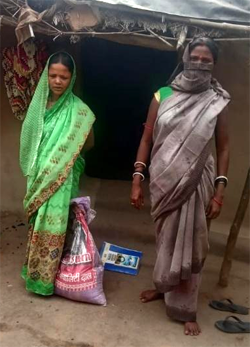In March, Prime Minister Narendra Modi ordered a lockdown for India’s 1.3 billion population, making it the world’s largest COVID-19 lockdown. Though the original lockdown order was for 21 days, it has been extended twice (so far) as the disease persists. As of Mother’s Day, India will be on day 47 of the lockdown.

Unfortunately, the shutdown left thousands of vulnerable people and families — including daily wage earners, single women, and migrant workers — without food on a daily basis.
Share & Care was ready to respond to this emergency. Our Disaster Committee met and evaluated proposals from various NGOs, including Pradan, the Anjali Mental Health Rights Organization, and Grameen Vikas Sodh Avam Takniki Kendra (GVSTK).
We immediately released funds to help.
Five kitchens were opened in partnership with Pradan and associated self-help group members at various community levels. The kitchen volunteers were trained in safe practices for working in a kitchen, as well as social distancing, and were given a supply of gloves, masks, and sanitizers.
On day one, the kitchens provided 600 people with kichadi (a dish of rice and beans). On day two they served rice, curry, and vegetables.
The volunteers also distributed groceries to needy families in rural areas, often in locations where no other help was available. This is Chavi Devi’s story.
Birsaram Village, Population 1,721
Chavi Devi lives in Birsaram, a village in Jaridih block, Bokaro district, Jharkhand. After her three children were born, she lost her husband 10 years ago at the age of 25.
Because of a mental health disorder, Chavi is unable to support herself. Now widowed, she and her children moved in with her aging parents. Today, her oldest son, 16, works in Bangalore and is the family’s sole wage earner.
When the coronavirus pandemic forced a lockdown, her son was in Bangalore, which meant he could not visit their village to bring money for his mother.
After a few days, Chavi’s food ran out. One day, when she hadn’t eaten for two days, a Pradan volunteer knocked on her door. Her name was Samla Kumari and she invited Chavi to come with her.
Samla escorted Chavi to where Pradan had set up a rations station. There Chavi was given 10 kg of rice, 1 kg dal, a packet of salt and turmeric, and two bars of soap.
Shocked, but happy and thankful, Chavi asked if there was any more help coming from the local or national government, to which Samla had to inform her that no, Pradan is the only source of rations for vulnerable families like Chavi’s.
“I have lost hope and our conditions are deteriorating every day, the help I received from Pradan brings happiness in my family’s life for some days.”
—Chavi Devi
Share & Care continues to monitor the situation and deliver help to those most in need. So far, across six blocks in Jharkhand:
- 5 Community Kitchens in support of 597 households
- Dry rations in support of 1,274 households

